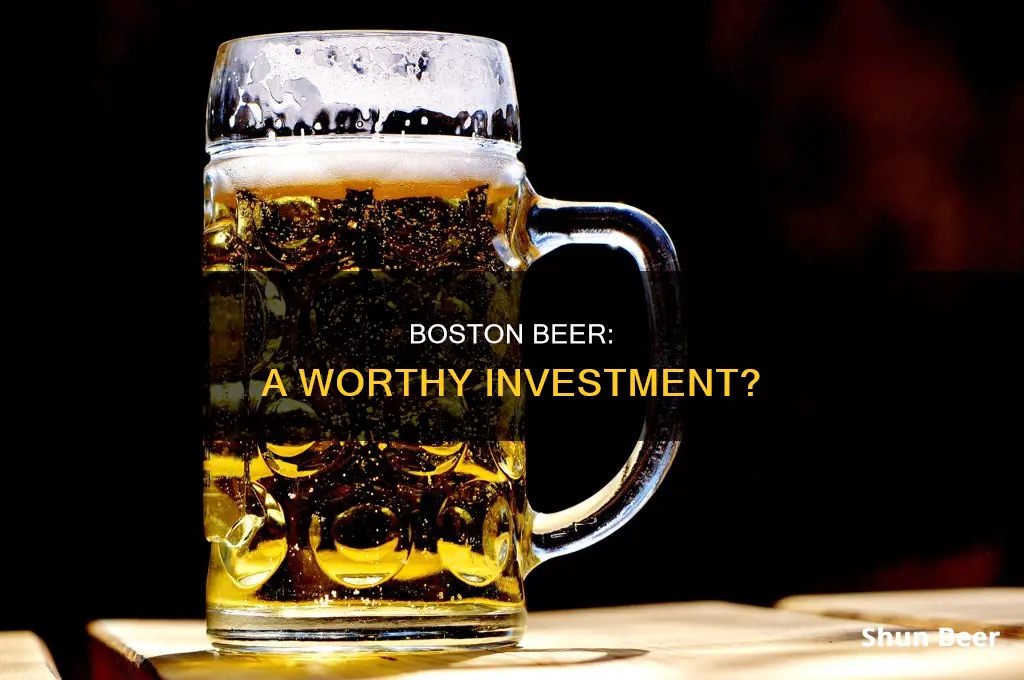
Boston Beer Co. is an alcoholic beverage company that produces hard seltzer, malt beverages, and hard cider. The company owns popular brands such as Truly Hard Seltzer, Twisted Tea, and Samuel Adams. While Boston Beer was once known primarily as a craft beer company, it has since expanded its offerings to include a range of alcoholic drinks. This diversification has helped the company reinvigorate its growth, especially as consumer preferences have shifted away from beer towards spiked seltzers and sweeter drinks. Boston Beer has also made strategic acquisitions, such as Dogfish Head, another well-established craft brewer, to boost its revenue.
Boston Beer's stock performance has been a topic of interest for investors, with some analysts recommending it as a buy, particularly as the company has made moves to expand its product offerings and capture changing consumer preferences. However, others have noted that the stock trades at a premium, with a high price-to-earnings ratio, making it an expensive investment option.
Overall, Boston Beer Co. appears to be well-positioned in the market, with a strong balance sheet and a diverse product portfolio that caters to evolving consumer preferences.
What You'll Learn

Boston Beer's stock performance and whether it's a good buy
Boston Beer Stock Performance and Whether It's a Good Buy
Overview
Boston Beer Co., Inc. (NYSE: SAM) is no longer just a craft beer company; it has expanded into a miniature alcohol conglomerate with a diverse portfolio of alcoholic beverages. The company's flagship Samuel Adams beer brand has faced challenges in recent years due to increasing competition and a shift in consumer preferences. However, Boston Beer has adapted by expanding its offerings beyond beer, including hard seltzers and sweeter drinks. This diversification strategy has helped the company reinvigorate its growth and stay relevant in a dynamic market.
Stock Performance and Outlook
As of July 1, 2020, Boston Beer stock was trading at a premium, with a trailing price-to-earnings (P/E) ratio of 65. While this made the stock expensive, the company's growth potential remained appealing. Analysts' estimates for 2020 and 2021 pointed towards a forward P/E ratio of about 41, indicating that investors expected strong earnings growth.
The performance of Boston Beer stock has been influenced by the company's ability to adapt to changing consumer preferences and its expansion beyond the flagship Samuel Adams brand. The company's revenue growth in recent years can be attributed to the success of its Truly Hard Seltzer brand, the acquisition of Dogfish Head, and the performance of legacy brands.
Analyst Recommendations
Analysts have provided mixed recommendations regarding Boston Beer stock. While some analysts have highlighted the company's growth potential and its ability to adapt to changing consumer preferences, others have noted that the stock trades at a significant premium. As of July 2020, one analyst acknowledged making a "terrible call" on the stock when they previously stated it was trading at an unrealistic price. However, with the stock more than 50% higher than it was in November, the analyst suggested that it was worth a look.
Recent Developments
- Boston Beer's stock fell 6% after a profit miss and lowered guidance in October 2023.
- In July 2023, Boston Beer's stock rallied due to the strong performance of Twisted Tea, which made up for flat seltzer demand in Q2.
- Boston Beer was upgraded to a "buy" rating from a neutral rating by Roth MKM in May 2023.
- In April 2023, two Bud Light executives left the company following calls for a boycott.
- Boston Beer's CFO, Frank Smalla, announced his departure in March 2023.
Boston Beer Co., Inc. has demonstrated its ability to adapt to changing market dynamics and consumer preferences by expanding beyond its core beer offerings. While the stock has traded at a premium, its growth potential and successful brand diversification make it an appealing investment opportunity. However, investors should carefully consider their risk tolerance, conduct thorough research, and consult with a financial advisor before making any investment decisions.
Buying Beer in Michigan: Grocery Store Guide
You may want to see also

Boston Beer's expansion into other alcoholic beverages
Boston Beer is no longer just a craft beer company. It has expanded into a miniature alcohol conglomerate, with its flagship Samuel Adams line of beers struggling in recent years. To reinvigorate growth, Boston Beer has looked to other areas, including hard seltzers and sweeter drinks. The company owns brands like Twisted Tea and Truly Hard Seltzer, and recently acquired Dogfish Head, another well-established craft brewer.
In 2021, Boston Beer and PepsiCo announced plans to enter a business collaboration to produce the alcoholic beverage Hard MTN DEW. However, in 2023, Virginia regulators dealt a significant blow to this partnership by prohibiting Boston Beer from selling Hard MTN DEW and Lipton Hard Iced Tea through PepsiCo's wholesaler in the state. Despite this setback, Boston Beer continues to diversify its product offerings beyond beer.
In April 2023, Boston Beer introduced Slingers Signature Cocktails, a line of ready-to-drink, malt-based cocktails with 8.0% ABV in 24oz cans. With three initial flavours, Bahama Mama, Peach Screwdriver, and Pineapple Punch, Boston Beer aimed to capitalise on the growing ready-to-drink category and higher-ABV offerings. This expansion demonstrates Boston Beer's commitment to innovation and meeting consumer demands beyond its traditional beer offerings.
Where to Buy Sam Adams' Marathon Beer
You may want to see also

Boston Beer's revenue growth and diversification
To drive revenue growth, Boston Beer has expanded its product offerings to align with evolving consumer preferences, particularly the rising popularity of hard seltzers and sweeter drinks. This strategy has proven effective, with the company reporting revenue growth in the first quarter of 2020, driven by a 36% increase in depletions (sales to distributors). Boston Beer's revenue growth in 2020 was attributed to the success of its Truly Hard Seltzer brand and the acquisition of Dogfish Head, another well-established craft brewer.
Boston Beer's revenue growth strategy also involves acquiring and developing a diverse range of brands beyond its core beer offerings. In addition to its Samuel Adams line, the company owns popular brands such as Twisted Tea, Angry Orchard, Hard Mountain Dew, and Sauza Agave Cocktails. The company has also expanded into the hard seltzer category with Truly and the non-alcoholic beverage space with Samuel Adams Non-Alcoholic styles.
Boston Beer's diversification strategy has been a key factor in its revenue growth and overall business performance. By expanding its brand portfolio and adapting to changing consumer preferences, the company has been able to offset declines in its flagship brand and maintain its competitive position in the dynamic alcohol beverage industry.
Looking ahead, Boston Beer's revenue growth and diversification strategy will continue to be crucial for its long-term success. The company's ability to identify and capitalize on emerging consumer trends, as well as its effective brand management and innovation, will be essential for driving sustainable revenue growth and maintaining its market position.
Utah's Sunday Beer Buying Laws Explained
You may want to see also

Boston Beer's financial health and valuation
Boston Beer Co., Inc. is a producer of alcoholic beverages, including hard seltzers, malt beverages, and hard cider. The company owns popular brands such as Truly Hard Seltzer, Twisted Tea, Samuel Adams, Angry Orchard, and Dogfish Head Craft Brewery. As of March 2024, the company had a market capitalisation of $3.66 billion.
In terms of financial health, Boston Beer has demonstrated both positive and negative performance indicators. On the positive side, the company has a good balance sheet, with $129.5 million in cash and short-term investments as of the first quarter of 2020. The company rarely issues new shares, which helps to keep investors' holdings from being diluted. Additionally, Boston Beer has shown the ability to adapt to changing consumer preferences by expanding its offerings beyond craft beer into hard seltzers and sweeter drinks. This diversification has led to revenue growth, with depletions (sales to distributors) increasing by 36% in the first quarter, including a 30% increase from Boston Beer legacy brands and a 6% contribution from Dogfish Head brands.
However, there have also been some concerns about Boston Beer's financial health. As of November 2023, the company's stock was considered expensive, with a trailing price-to-earnings (P/E) ratio of 65. While the company has growth potential, particularly with its expansion beyond its flagship brand, its stock is still trading at a significant premium.
In terms of valuation, Boston Beer's stock has seen significant fluctuations. As of November 2023, the stock was trading at a price of around $311.97, with a 52-week range of $296.27 to $420.50. The stock has experienced both ups and downs, with analysts providing varying recommendations. Some analysts have recommended buying the stock, particularly after the company's expansion into new beverage categories and the acquisition of Dogfish Head. Others have been more cautious, citing the stock's premium price and the competition in the craft beer market.
Overall, Boston Beer's financial health appears to be mixed. While the company has a strong balance sheet and has made strategic moves to diversify its product offerings, it also faces challenges in terms of stock valuation and competition in the beverage industry. As always, investors should carefully consider their own financial goals and risk tolerance before making any investment decisions.
Buying Beer in Pennsylvania: Convenience Store Conundrum
You may want to see also

Boston Beer's market competition and industry challenges
Boston Beer faces competition from a variety of sources, including other craft brewers, imported beers, and large domestic brewers. The company's flagship Samuel Adams line has struggled in recent years due to an increase in the number of craft beer brands in the US, as well as weakening interest in beer in general. This has led to a decline in market share for Boston Beer, as consumers are presented with more choices.
The company has also faced challenges due to increased competition in the craft beer category and weakness in the cider category, with consumers showing a growing interest in hard soda. In addition, Boston Beer competes with other alcoholic beverages, such as wine and spirits, for drinker attention and consumption. The pace of innovation in these categories is increasing, and Boston Beer must work to develop strategies to remain competitive.
Furthermore, Boston Beer faces competition from imported beers such as Corona, Heineken, and Modelo Especial, which have gained market share in the US over the last ten years. These imported beers may have substantially greater financial resources, marketing strength, and distribution networks than Boston Beer.
The two largest brewers in the US, MillerCoors and AB InBev, have also entered the craft beer category, either by developing their own beers, acquiring craft breweries, importing and distributing foreign brands, or increasing their development and marketing efforts on their own specialty beers. This competition has intensified with the formation of dedicated business units within these large brewers that are focused exclusively on competing in the craft beer market.
To stay competitive, Boston Beer has expanded its offerings beyond craft beer, including hard seltzers and sweeter drinks. The company has also introduced new styles under the Samuel Adams brand, such as canned nitro beers and a grapefruit-flavoured IPA. Additionally, Boston Beer has acquired other craft brewers, such as Dogfish Head, to increase its footprint outside of its flagship brand. These moves have helped the company to reinvigorate growth and position itself in line with changing consumer preferences.
Buying Beer at Brew Detroit: What You Need to Know
You may want to see also
Frequently asked questions
Boston Beer is a good investment for those looking to diversify their portfolio in the alcohol beverage industry. The company has a good balance sheet and is making the right moves to expand its offerings at a time when its flagship brand, Samuel Adams, isn't as popular as it once was.
As of March 5, 2024, Boston Beer's market capitalisation was $3.66 billion, with a previous close of $299.64. The stock price has fluctuated, with a 52-week range of 296.27 to 420.50.
Boston Beer owns several well-known brands, including Truly Hard Seltzer, Twisted Tea, Samuel Adams, Angry Orchard Hard Cider, and Dogfish Head Craft Brewery.
As with any investment, there are risks to consider before buying Boston Beer stock. The company has faced challenges due to increased competition in the craft beer market, and its flagship brand, Samuel Adams, has struggled in recent years. Additionally, the overall popularity of beer has been decreasing, which has impacted Boston Beer's performance.







